Abstract
The immunological cross-reaction between penicillins and a cephalosporin derivative (cephaloridine CEPR) has been investigated. Cross-allergenicity was studied in twenty-four patients with established penicillin allergy using a variety of tests. Skin tests, quantitative leucocyte challenge (estimating histamine release by allergen) and lymphocyte stimulation (transformation) tests were performed, using CEPR, conjugates of CEPR with human serum albumin (HSA) and bovine gamma-globulin (BGG), benzylpenicillin and benzylpenicilloyl (BPO) conjugates with HSA and BGG. A cross-reaction was clearly established in the majority of patients. The highest percentage of positive results (cross-allergenicity) was obtained in the leucocyte challenge test (80 per cent with CEPR.BGG), followed by the lymphocyte stimulation test (50 per cent with CEPR.BGG), and then the skin test (46 per cent with CEPR.HSA). None of ten non-allergic controls gave a positive result in these tests. Three of the penicillin allergic patients had received cephaloridine, and all three developed allergic reactions. Cross-antigenicity has also been shown by haemagglutination and haemagglutination-inhibition tests on serum from larger groups of penicillin-allergic patients (including the previously mentioned twenty-four patients), and of non-allergic controls, who had anti-BPO antibodies.
Full text
PDF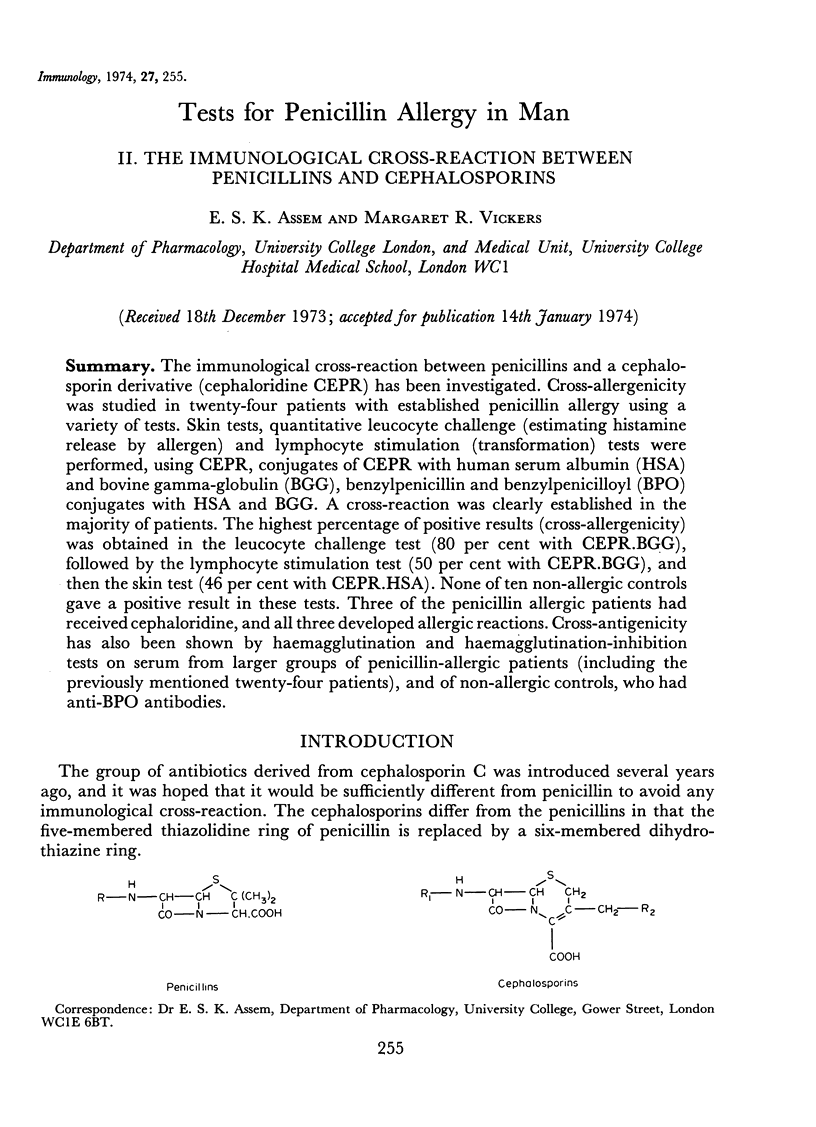
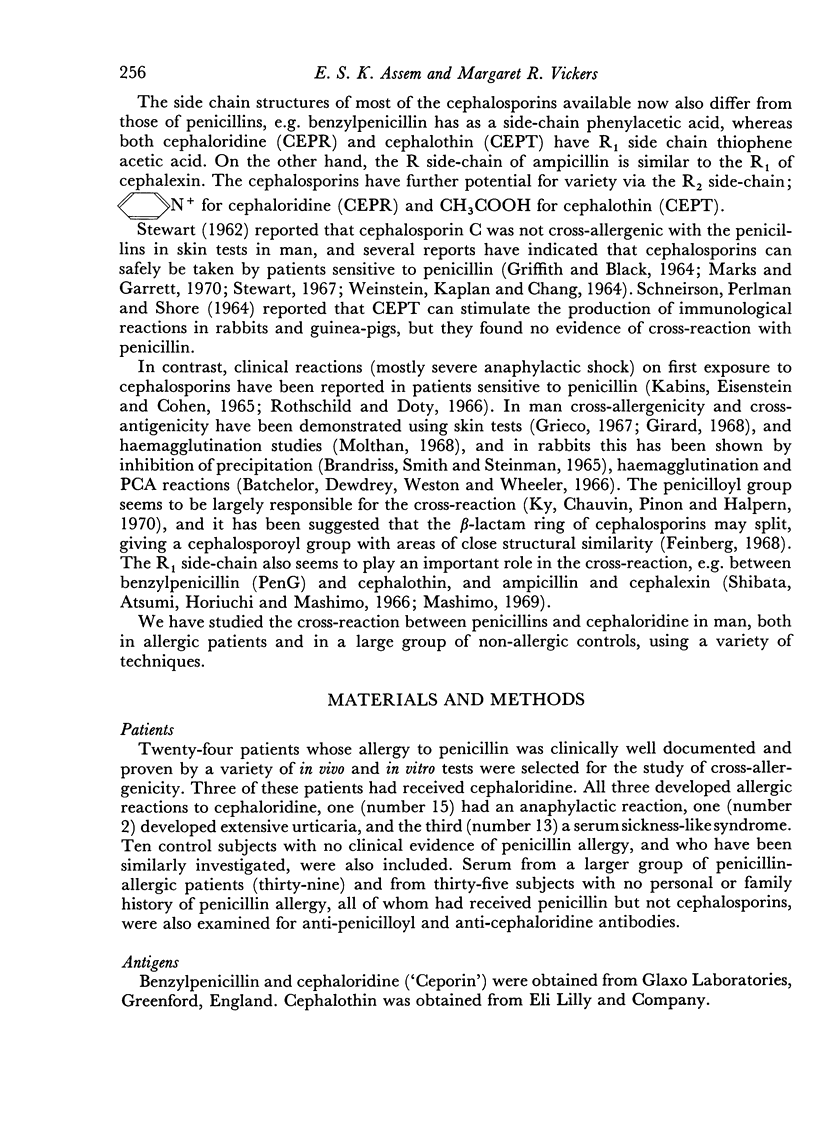
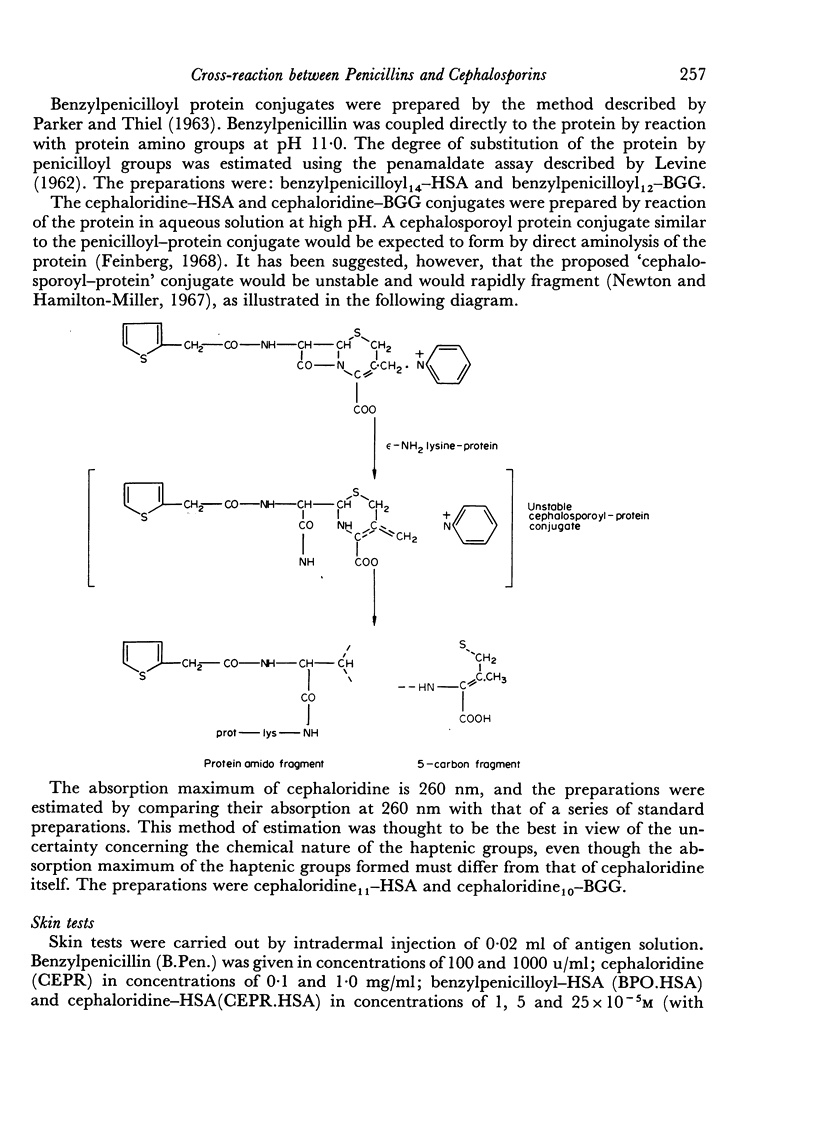
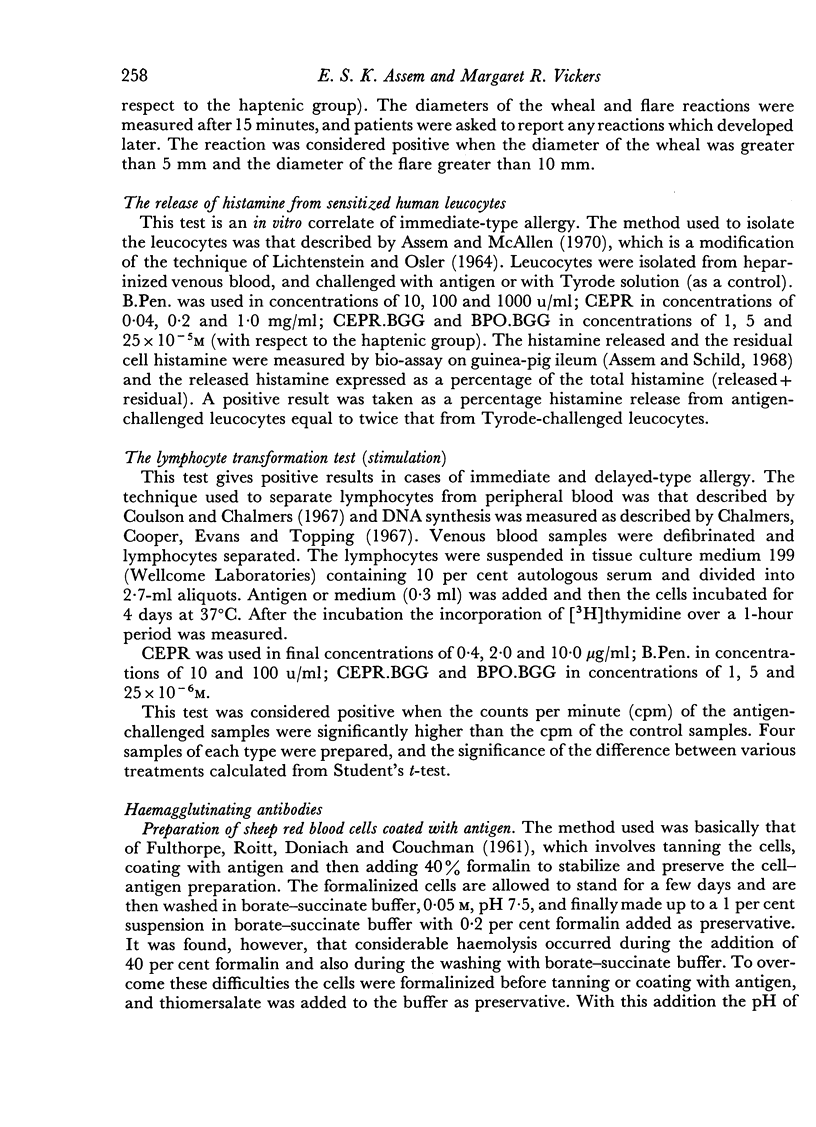
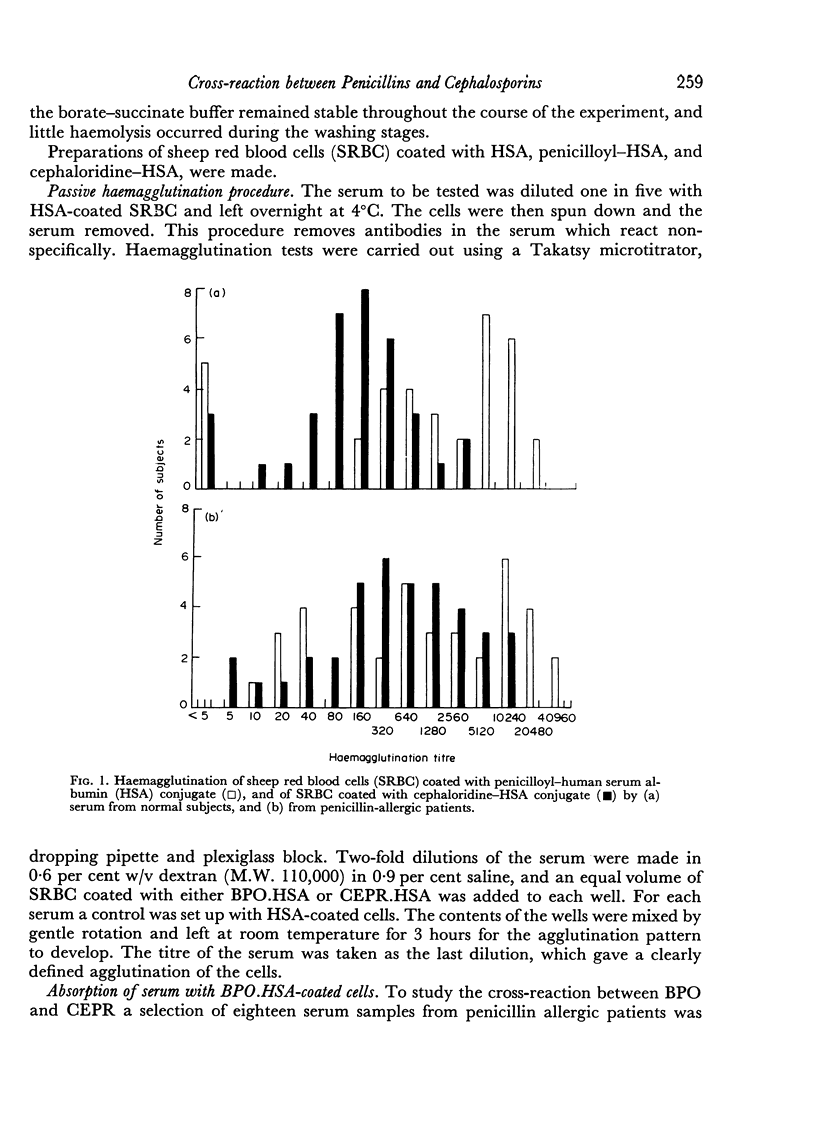
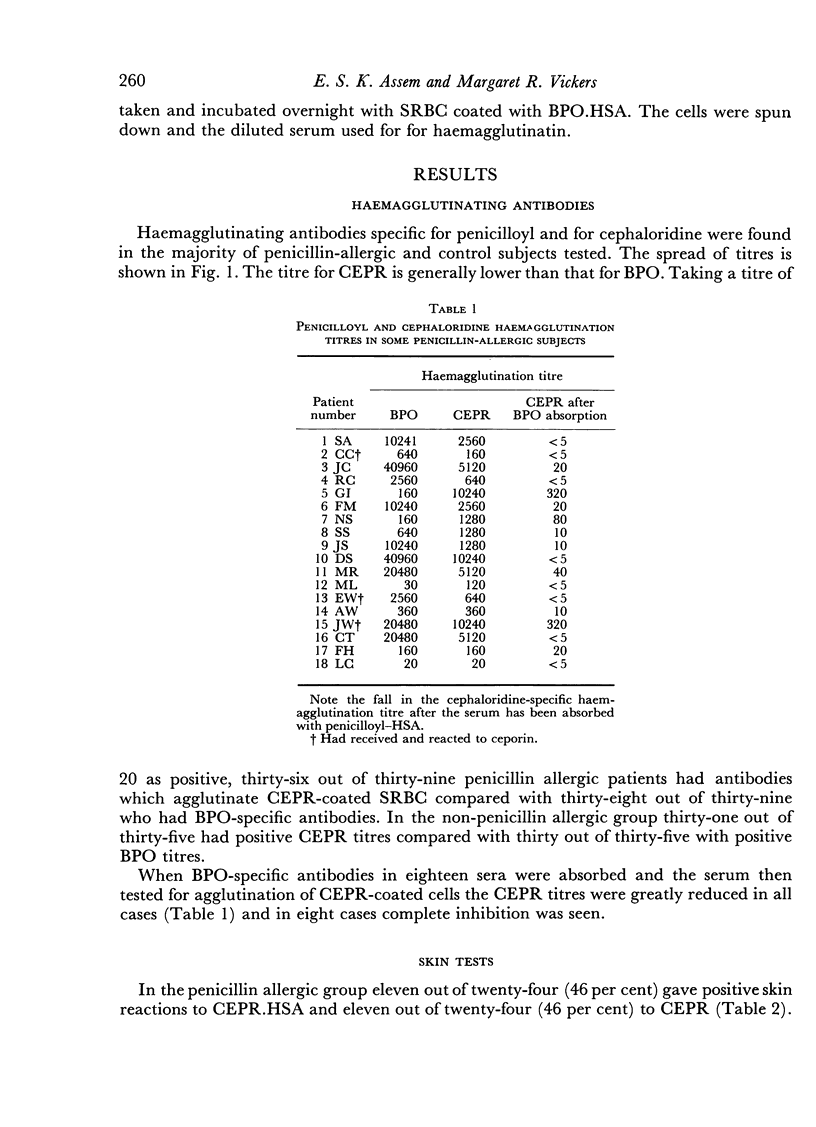
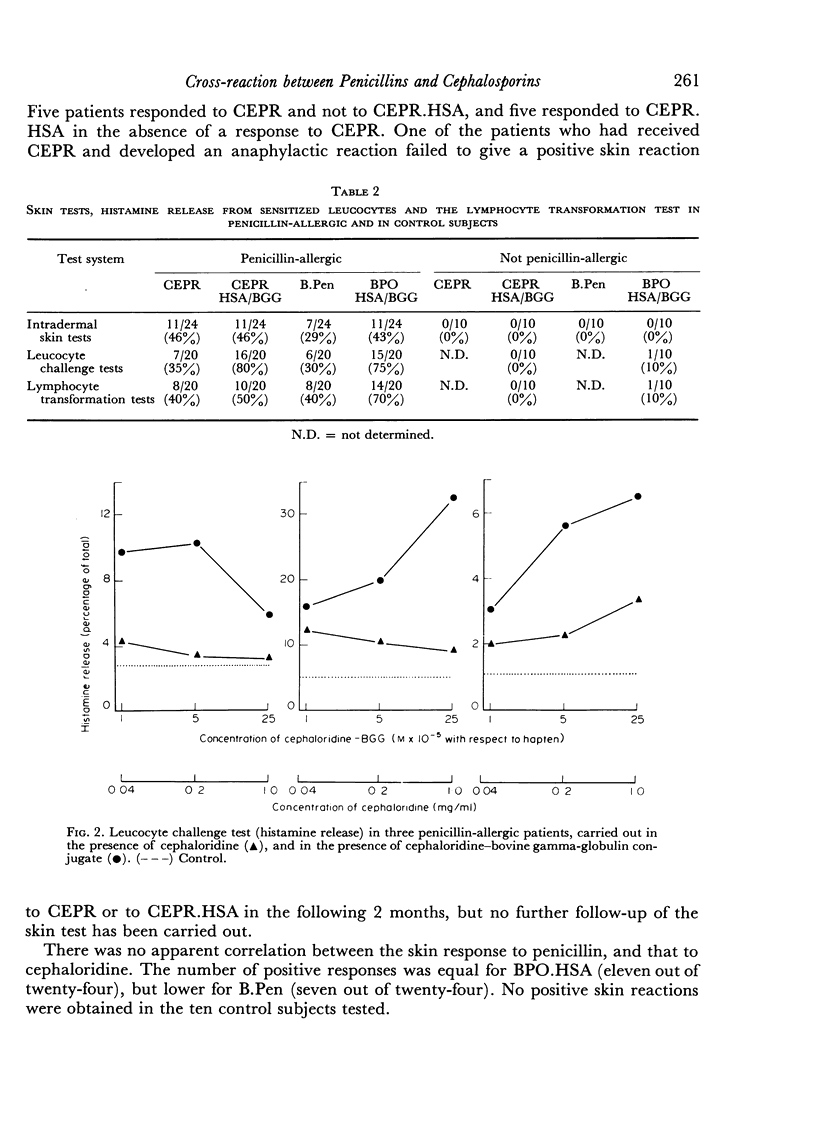
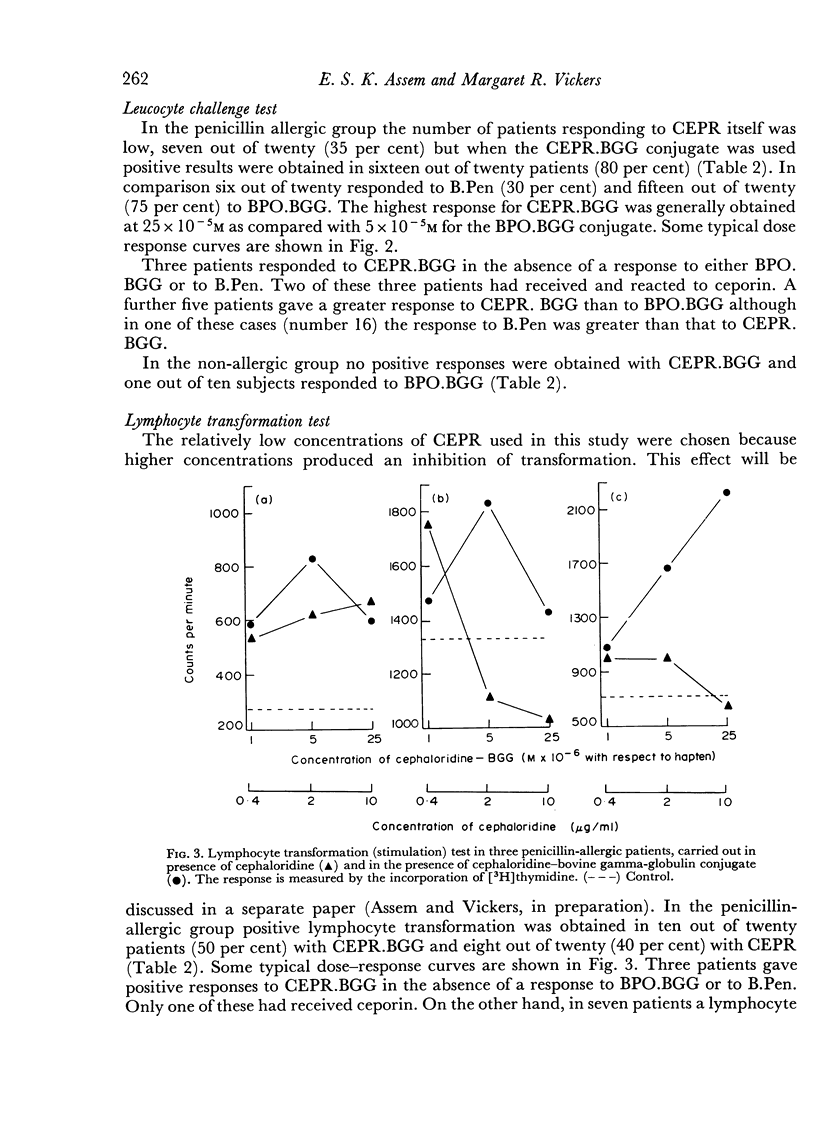
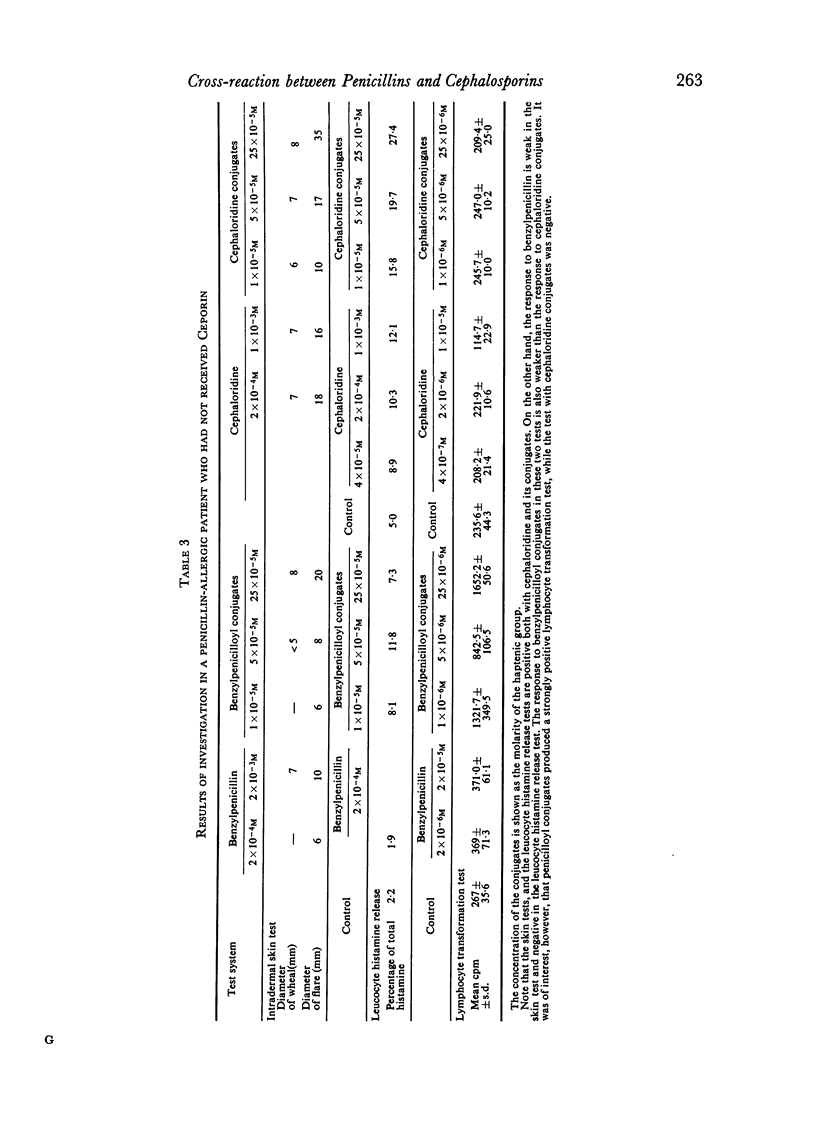
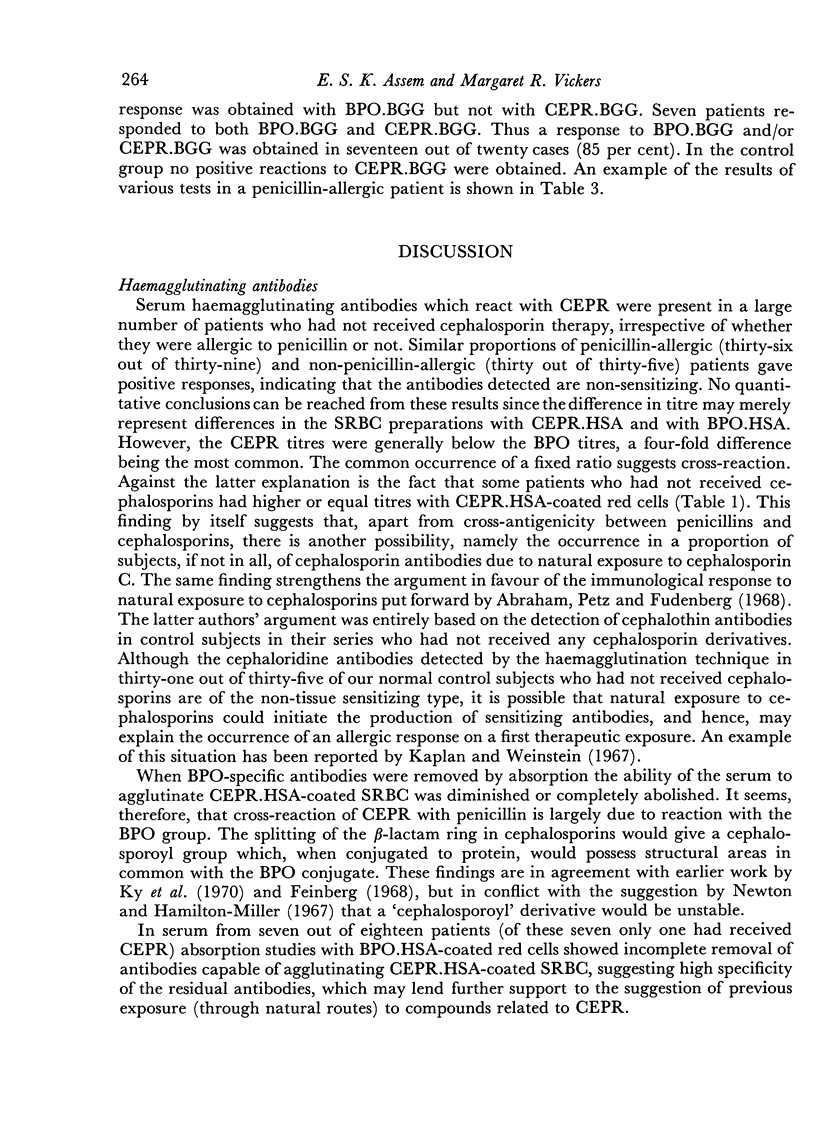
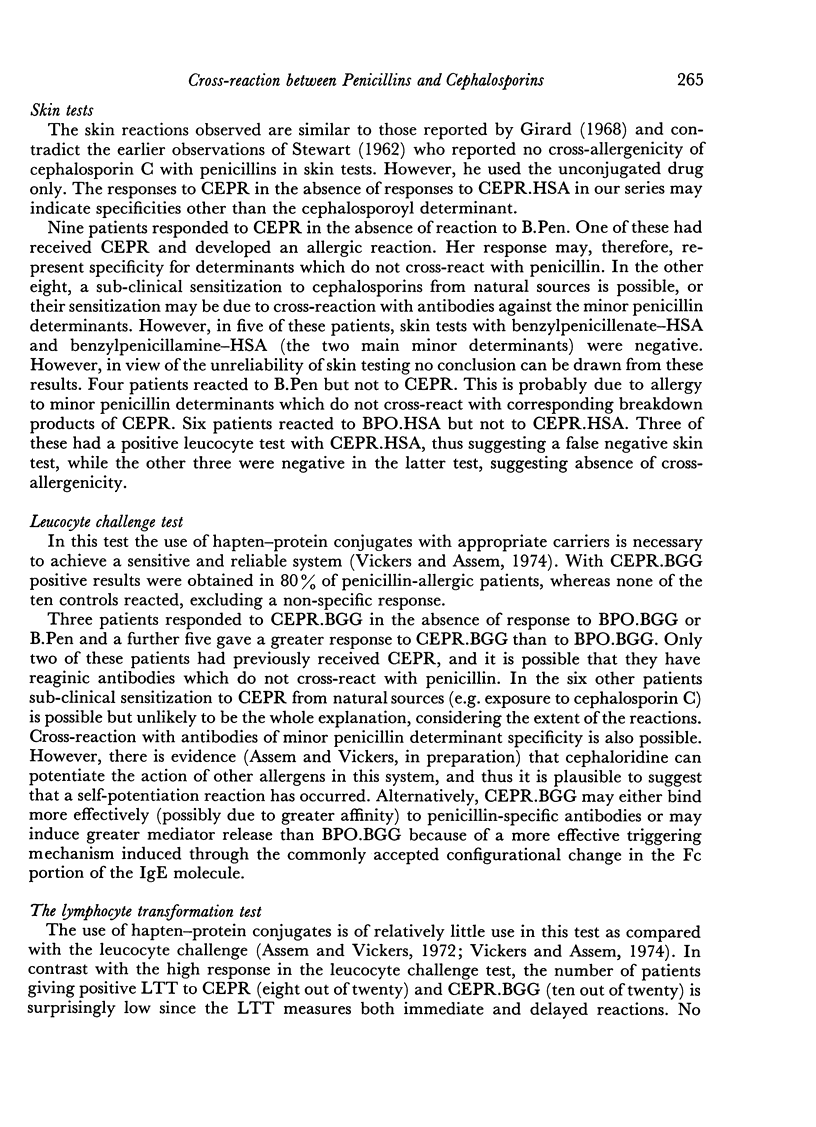
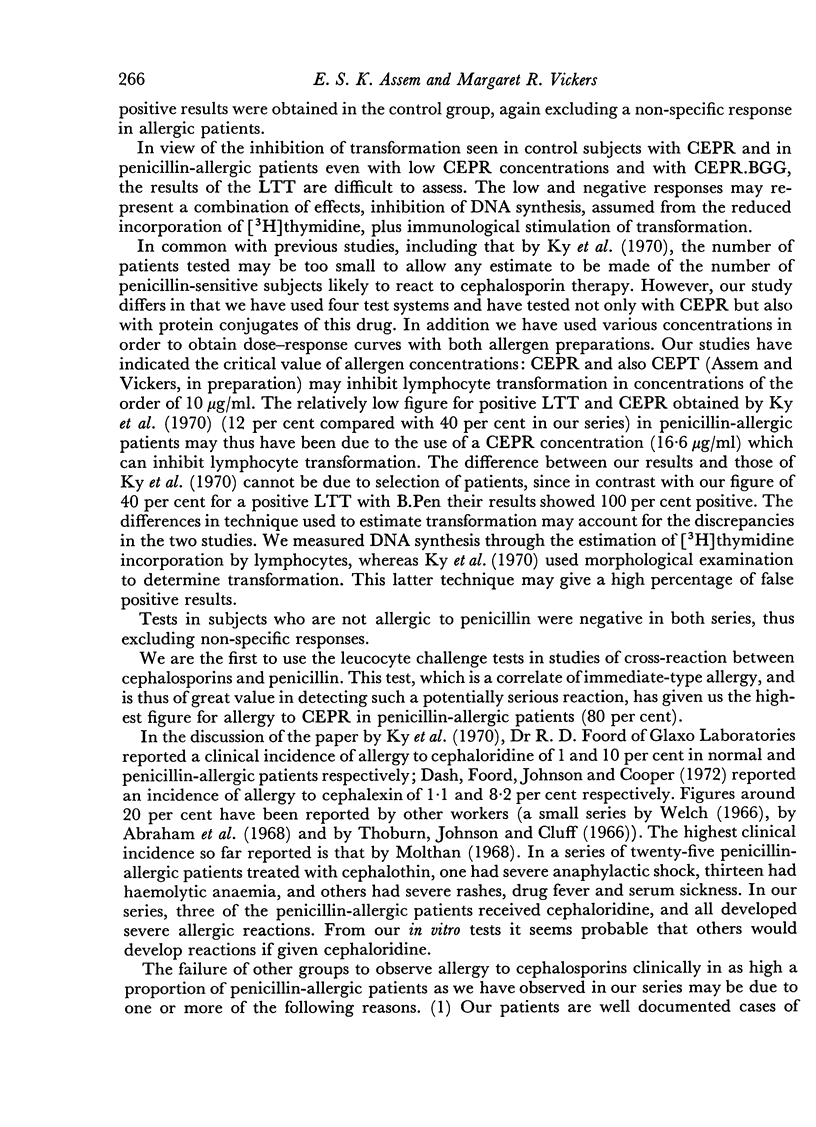
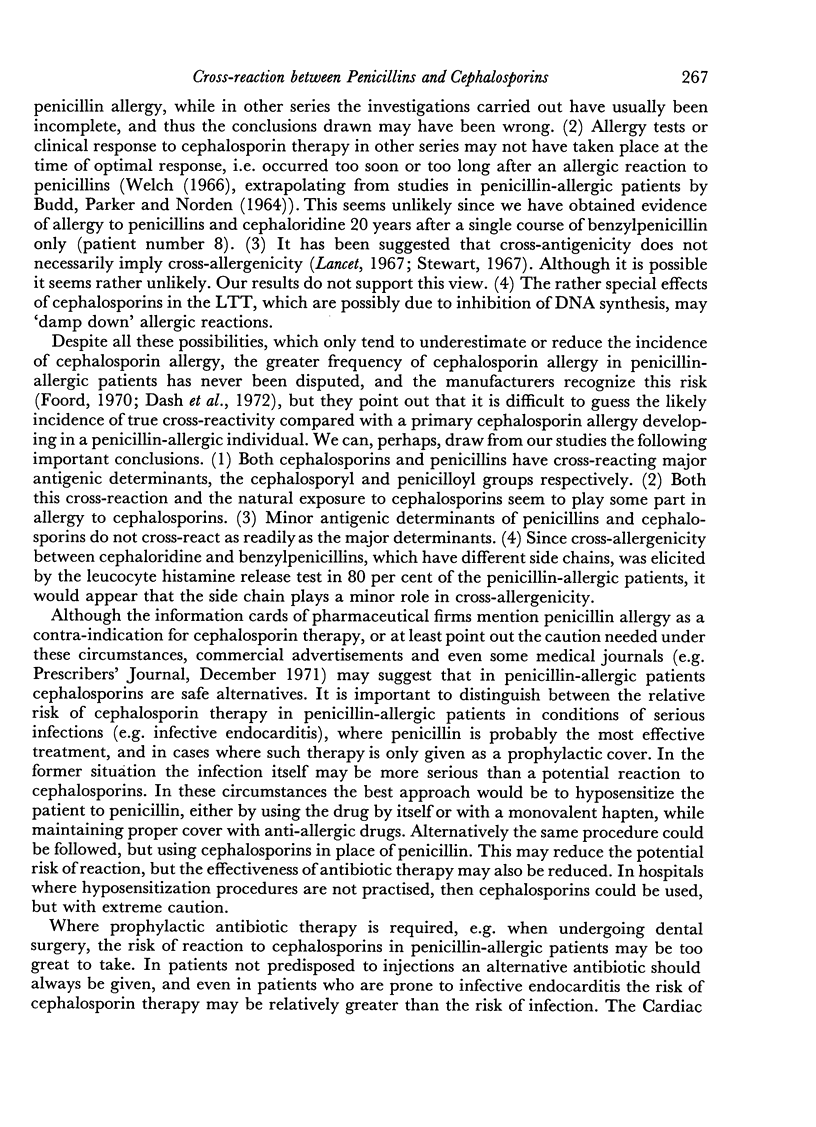
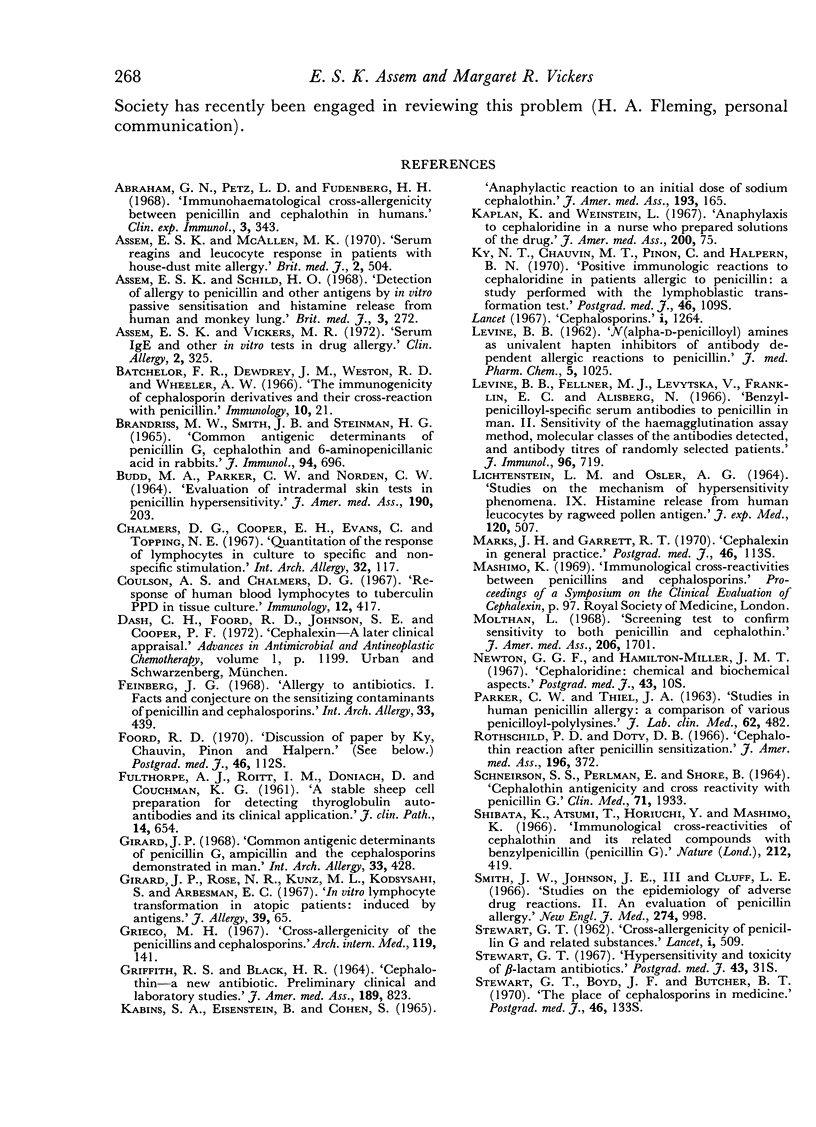
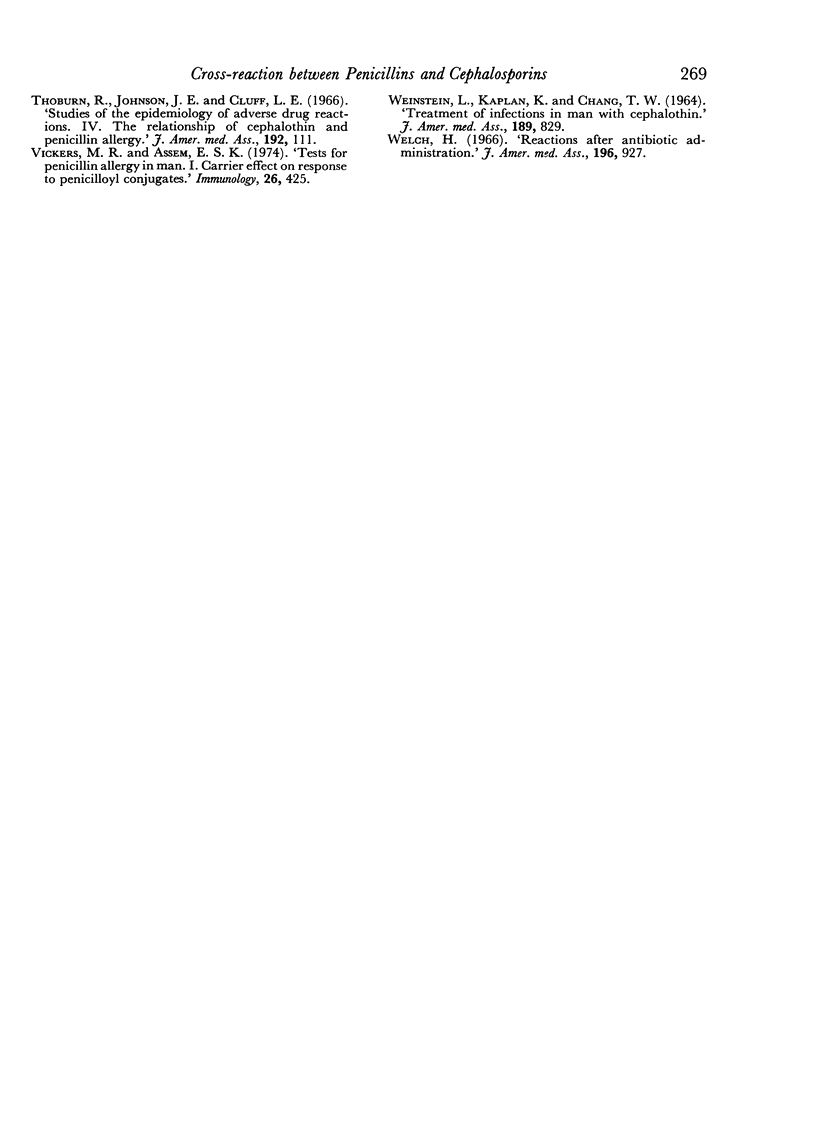
Selected References
These references are in PubMed. This may not be the complete list of references from this article.
- Abraham G. N., Petz L. D., Fudenberg H. H. Immunohaematological cross-allergenicity between penicillin and cephalothin in humans. Clin Exp Immunol. 1968 May;3(4):343–357. [PMC free article] [PubMed] [Google Scholar]
- Assem E. S., McAllen M. K. Serum reagins and leucocyte response in patients with house-dust mite allergy. Br Med J. 1970 May 30;2(5708):504–507. doi: 10.1136/bmj.2.5708.504. [DOI] [PMC free article] [PubMed] [Google Scholar]
- Assem E. S., Schild H. O. Detection of allergy to penicillin and other antigens by in-vitro passive sensitization and histamine release from human and monkey lung. Br Med J. 1968 Aug 3;3(5613):272–276. doi: 10.1136/bmj.3.5613.272. [DOI] [PMC free article] [PubMed] [Google Scholar]
- Assem E. S., Vickers M. R. Serum IgE and other in vitro tests in drug allergy. Clin Allergy. 1972 Dec;2(4):325–334. doi: 10.1111/j.1365-2222.1972.tb01297.x. [DOI] [PubMed] [Google Scholar]
- BRANDRISS M. W., SMITH J. W., STEINMAN H. G. COMMON ANTIGENIC DETERMINANTS OF PENICILLIN G, CEPHALOTHIN AND 6-AMINOPENICILLANIC ACID IN RABBITS. J Immunol. 1965 May;94:696–704. [PubMed] [Google Scholar]
- BUDD M. A., PARKER C. W., NORDEN C. W. EVALUATION OF INTRADERMAL SKIN TESTS IN PENICILLIN HYPERSENSITIVITY. JAMA. 1964 Oct 19;190:203–205. doi: 10.1001/jama.1964.03070160027006. [DOI] [PubMed] [Google Scholar]
- Batchelor F. R., Dewdney J. M., Weston R. D., Wheeler A. W. The immunogenicity of cephalosporin derivatives and their cross-reaction with penicillin. Immunology. 1966 Jan;10(1):21–33. [PMC free article] [PubMed] [Google Scholar]
- Chalmers D. G., Cooper E. H., Evans C., Topping N. E. Quantitation of the response of lymphocytes in culture to specific and non-specific stimulation. Int Arch Allergy Appl Immunol. 1967;32(2):117–130. doi: 10.1159/000229922. [DOI] [PubMed] [Google Scholar]
- Coulson A. S., Chalmers D. G. Response of human blood lymphocytes to tuberculin PPD in tissue culture. Immunology. 1967 Apr;12(4):417–429. [PMC free article] [PubMed] [Google Scholar]
- Crieco M. H. Cross-allergenicity of the penicillins and the cephalosporins. Arch Intern Med. 1967 Feb;119(2):141–145. doi: 10.1001/archinte.119.2.141. [DOI] [PubMed] [Google Scholar]
- FULTHORPE A. J., ROITT I. M., DONIACH D., COUCHMAN K. A stable sheep cell preparation for detecing thyroglobulin auto-antibodies and its clinical applications. J Clin Pathol. 1961 Nov;14:654–660. doi: 10.1136/jcp.14.6.654. [DOI] [PMC free article] [PubMed] [Google Scholar]
- Feinberg J. G. Allergy to antibiotics. I. Fact and conjecture on the sensitizing contaminants of penicillins and cephalosporins. Int Arch Allergy Appl Immunol. 1968;33(5):439–443. [PubMed] [Google Scholar]
- GRIFFITH R. S., BLACK H. R. CEPHALOTHIN--A NEW ANTIBIOTIC. PRELIMINARY CLINICAL AND LABORATORY STUDIES. JAMA. 1964 Sep 14;189:823–828. [PubMed] [Google Scholar]
- Girard J. P. Common antigenic determinants of penicillin G, ampicillin and the cephalosporins demonstrated in men. Int Arch Allergy Appl Immunol. 1968;33(5):428–438. doi: 10.1159/000230058. [DOI] [PubMed] [Google Scholar]
- Girard J. P., Rose N. R., Kunz M. L., Kobayashi S., Arbesman C. E. In vitro lymphocyte transformation in atopic patients: induced by antigens. J Allergy. 1967 Feb;39(2):65–81. doi: 10.1016/0021-8707(67)90113-x. [DOI] [PubMed] [Google Scholar]
- KABINS S. A., EISENSTEIN B., COHEN S. ANAPHYLACTOID REACTION TO AN INITIAL DOSE OF SODIUM CEPHALOTHIN. JAMA. 1965 Jul 12;193:165–166. doi: 10.1001/jama.1965.03090020079028. [DOI] [PubMed] [Google Scholar]
- Kaplan K., Weinstein L. Anaphylaxis to cephaloridine in a nurse who prepared solutions of the drug. JAMA. 1967 Apr 3;200(1):75–77. [PubMed] [Google Scholar]
- LEVINE B. B. N(ALPHA-D-PENICILLOYL) AMINES AS UNIVALENT HAPTEN INHIBITORS OF ANTIBODYDEPENDENT ALLERGIC REACTIONS TO PENICILLIN. J Med Pharm Chem. 1962 Sep;91:1025–1034. doi: 10.1021/jm01240a016. [DOI] [PubMed] [Google Scholar]
- LICHTENSTEIN L. M., OSLER A. G. STUDIES ON THE MECHANISMS OF HYPERSENSITIVITY PHENOMENA. IX. HISTAMINE RELEASE FROM HUMAN LEUKOCYTES BY RAGWEED POLLEN ANTIGEN. J Exp Med. 1964 Oct 1;120:507–530. doi: 10.1084/jem.120.4.507. [DOI] [PMC free article] [PubMed] [Google Scholar]
- Levine B. B., Fellner M. J., Levytska V., Franklin E. C., Alisberg N. Benzylpenicilloyl-specific serum antibodies to penicillin in man. II. Sensitivity of the hemagglutination assay method, molecular classes of the antibodies detected, and antibody titers of randomly selected patients. J Immunol. 1966 Apr;96(4):719–726. [PubMed] [Google Scholar]
- PARKER C. W., THIEL J. A. STUDIES IN HUMAN PENICILLIN ALLERGY: A COMPARISON OF VARIOUS PENICILLOYL-POLYLYSINES. J Lab Clin Med. 1963 Sep;62:482–491. [PubMed] [Google Scholar]
- STEWART G. T. Cross-allergenicity of penicillin G and related substances. Lancet. 1962 Mar 10;1(7228):509–510. doi: 10.1016/s0140-6736(62)91481-2. [DOI] [PubMed] [Google Scholar]
- Shibata K., Atsumi T., Horiuchi Y., Mashimo K. Immunological cross-reactivities of cephalothin and its related compounds with benzylpenicillin (penicillin G). Nature. 1966 Oct 22;212(5060):419–420. doi: 10.1038/212419a0. [DOI] [PubMed] [Google Scholar]
- Smith J. W., Johnson J. E., Cluff L. E. Studies on the epidemiology of adverse drug reactions. II. An evaluation of penicillin allergy. N Engl J Med. 1966 May 5;274(18):998–1002. doi: 10.1056/NEJM196605052741804. [DOI] [PubMed] [Google Scholar]
- Vickers M. R., Assem E. S. Tests for penicillin allergy in man. I. Carrier effect on response to penicilloyl conjugates. Immunology. 1974 Feb;26(2):425–440. [PMC free article] [PubMed] [Google Scholar]
- WEINSTEIN L., KAPLAN K., CHANG T. W. TREATMENT OF INFECTIONS IN MAN WITH CEPHALOTHIN. JAMA. 1964 Sep 14;189:829–834. doi: 10.1001/jama.1964.03070110031006. [DOI] [PubMed] [Google Scholar]


